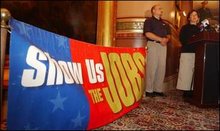As Countrywide Financial Corp’s CEO was recently quoted, “Capitalism isn’t perfect.” Countrywide Credit is widely expected to file for bankruptcy.
Despite a lot of regulation in the banking industry, over 50% of mortgages are made by companies which are unregulated at the federal level. This reflects the fashionable bipartisan deregulation policies of the past 25 years.
If left to the market, resetting interest rates are going to push up defaults over the next eight months or so. This is true to a lesser extent in Vermont, where foreclosures through the first ten months of the year were 994, up 30% from a year ago, according to the Vermont Department of Banking, Insurance, Securities & Health Care Administration.
The state doesn’t have numbers on the number of mortgages which are due to reset in 2008-2009. One approach is to take the national average – about 35% of mortgages nationwide sold in 2005-2006 were adjustable rate mortgages – and apply that to the number of homes sold in 2005 and 2006. In 2005, 17,815 homes were sold, while last year 15,878 homes were sold, according to Vermont Realtors. That means that maybe there are maybe 11,800 or so adjustable rate mortgages in Vermont which will face increasing interest rates next year. Its not a huge number, but it could certainly spell trouble for the families and neighborhoods involved.
Foreclosure impacts everybody, the foreclosed family, renters and solvent homeowners, just in different ways. Foreclosed homes typically sell at a discount of 20-25% to other owner-occupied homes. This price drop drags down comparable prices in the neighborhood as the foreclosed home sales price is factored in. Renters can face eviction.
A few proposals being floated would limit the pain. The chair of the Federal Deposit Insurance Corp. is proposing that mortgage companies freeze interest rates on adjustable rate mortgages at the current rate to help borrowers avoid trouble. Essentially, this would convert the starter rate to a fixed rate. Banks will not be happy. Hey, if the “teaser” starter interest rate was good enough for the lending institution when it made the loan, it should be good enough for it for the life of the loan, no? A more tentative approach is being promoted by California Gov. Schwarzenegger who advocates freezing interest rates on certain adjustable rate mortgages for a period of time. Much more meaningful steps to protect homeowners and renters were taken during the New Deal, as in Canada today. What can and should Vermont policymakers do?
Wednesday, November 28, 2007
The “F” Word
It’s out. It’s not resetting interest rates that are the big factor behind the surge in home loan defaults YET. Most of the defaults happening today are for mortgages under a year old and so hadn’t even hit the two year reset mark. (Nationwide, more than half of the subprime delinquencies and foreclosures this year were loans that hadn’t reset.) Its not lending to people with poor credit scores. Nope, what we have here are loans made by lenders 1) without following prudent underwriting practices, like checking pay stubs for income verification, 2) by lenders creating ever more precarious mortgage products, and 3) some mixture of fraud. Fraud includes that by borrowers – who lied about their financial status - and lenders – who encouraged, aided and abetted the lies, while hiding the mortgage’s risky terms.
Subscribe to:
Posts (Atom)
